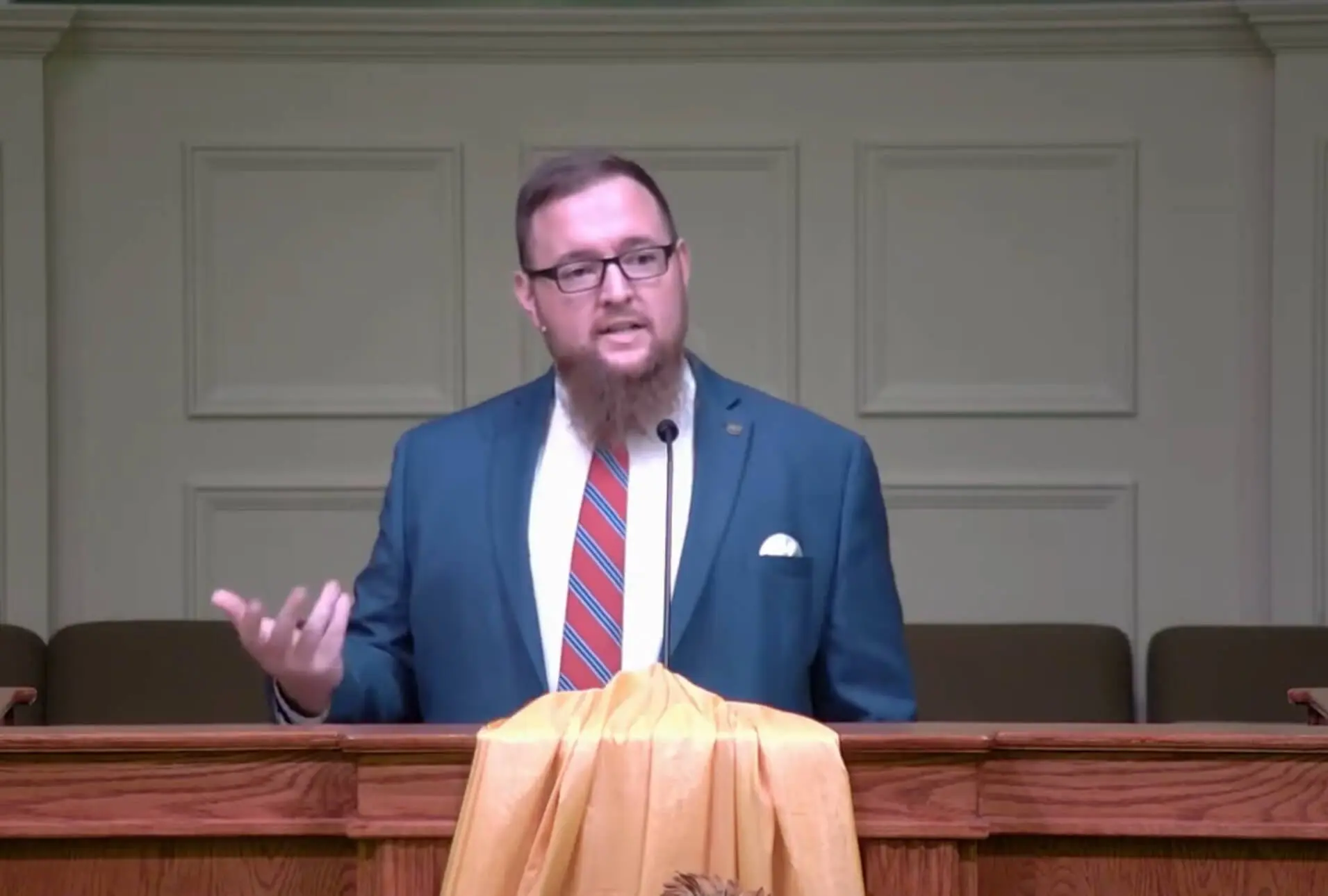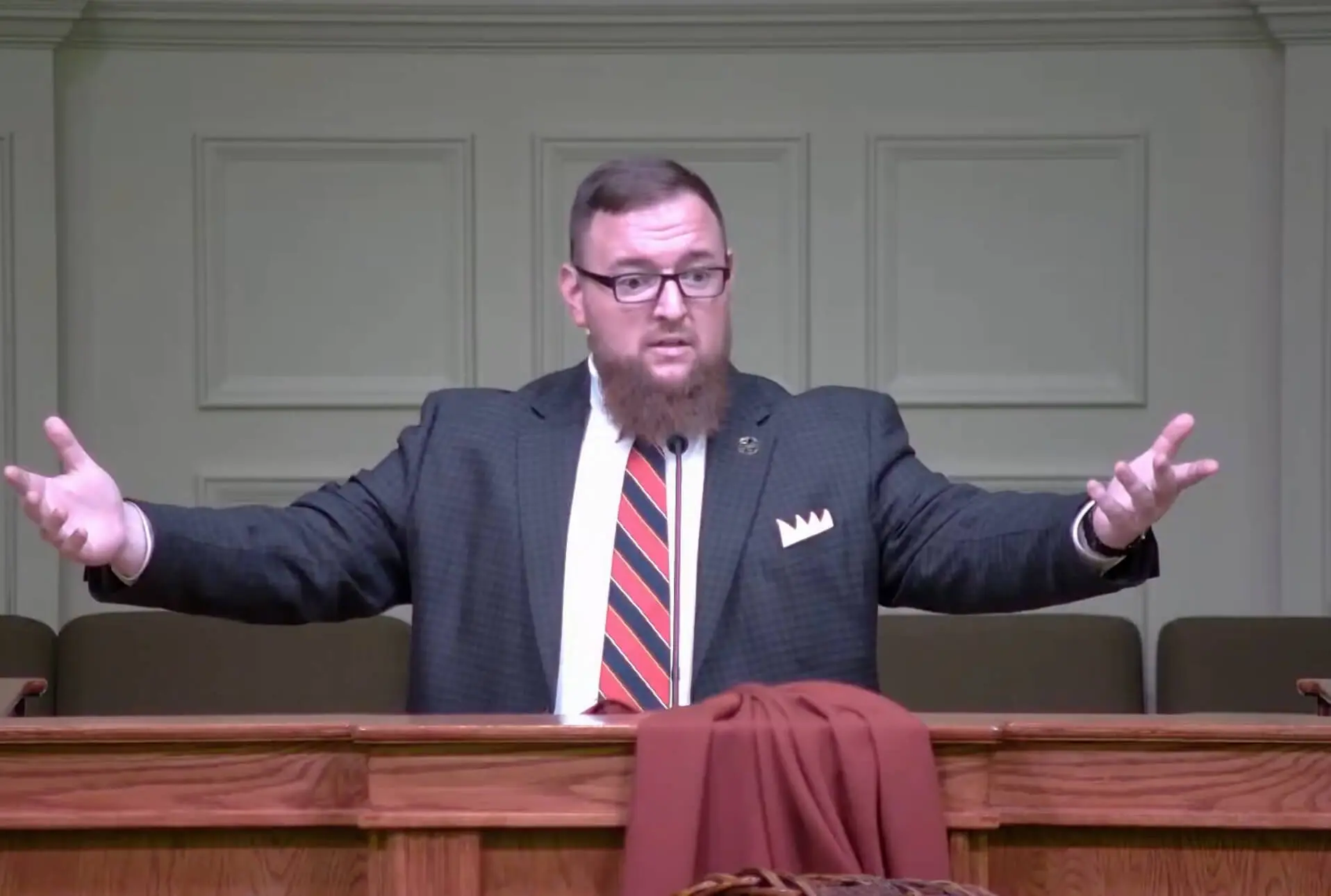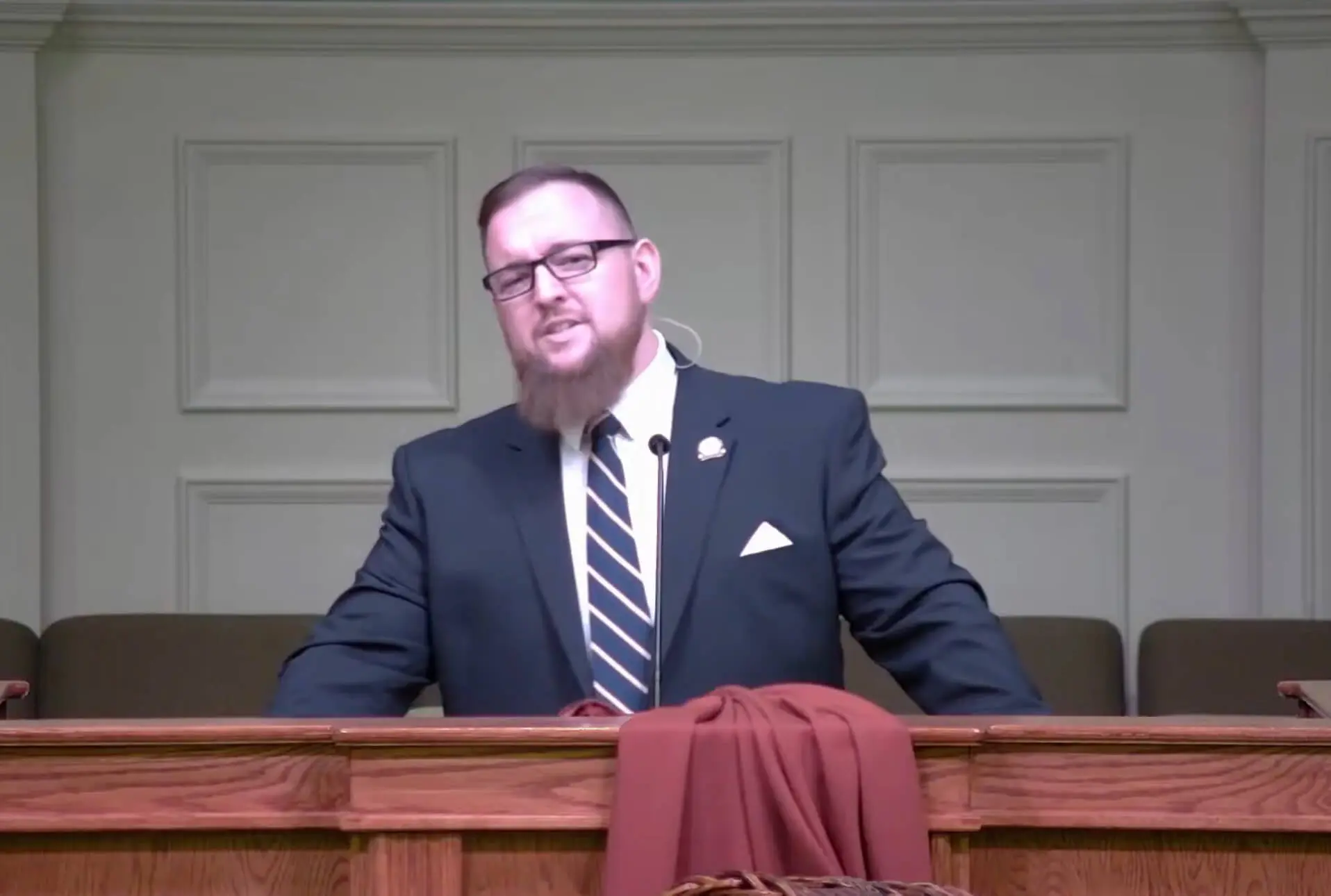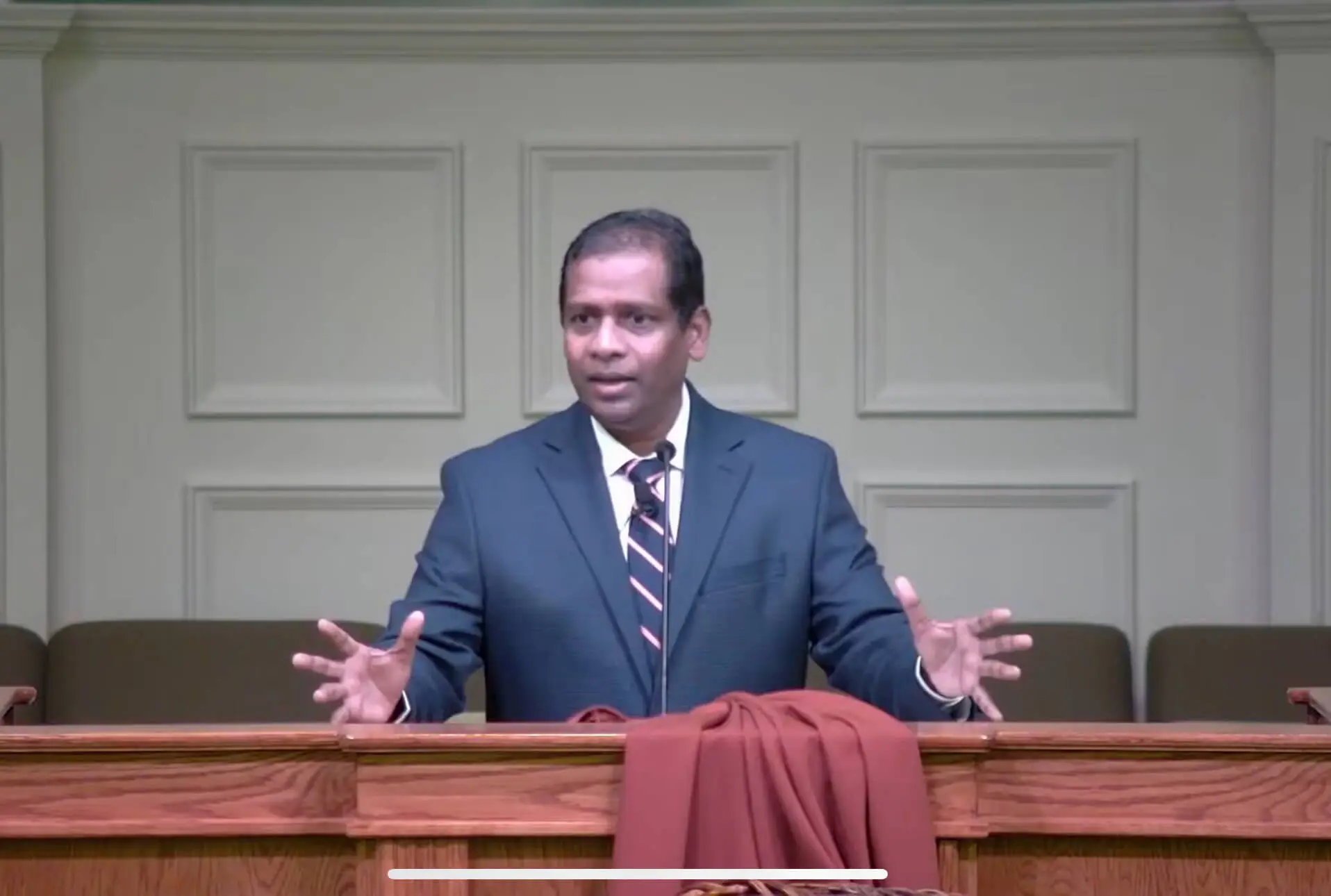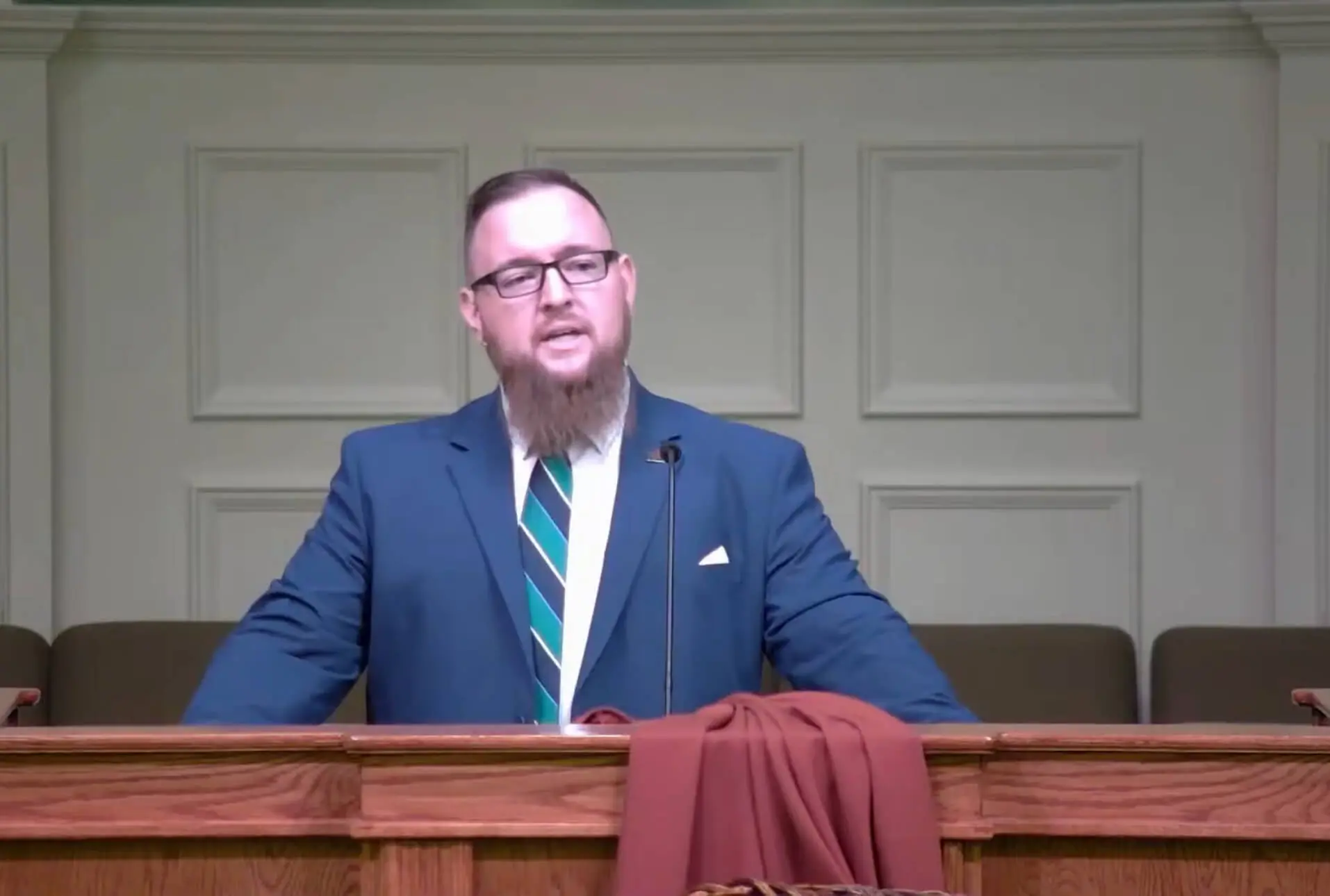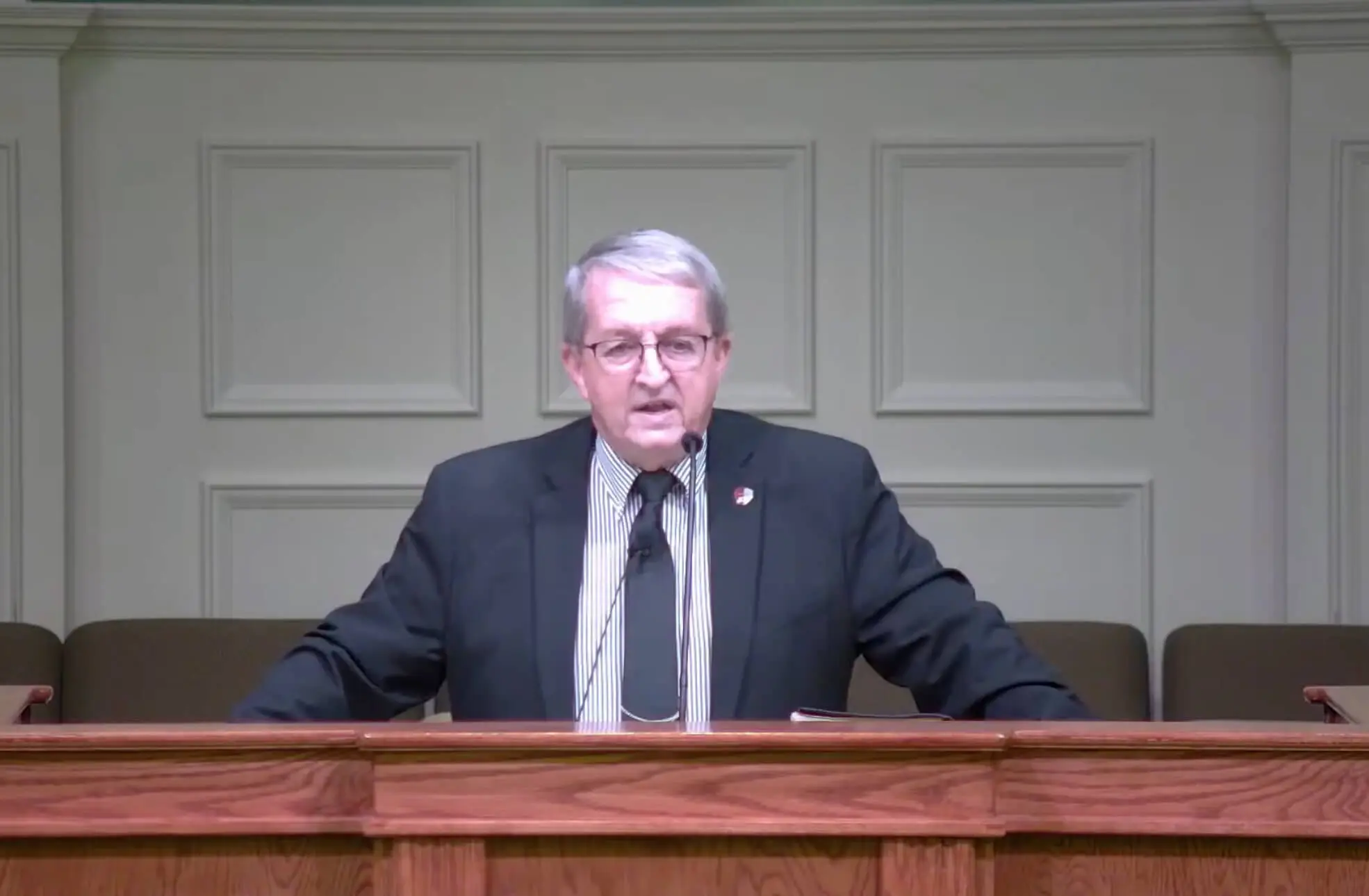Video
“The Equality of the Son”
John 5:18-25
Pastor Ryan J. McKeen
09/28/2025
Audio
Transcript
Turn with me in your Bibles to John chapter five. John chapter five. As you know, we are in the middle of our Son of God series, where we are tracing the theme of this name for Jesus throughout the Gospel of John.
We come now to the fourth time that this name is used, and it appears here in John chapter five. And it is here that we really begin to see how the different uses of this name and what each one reveals begin to build on each other, begin to add to the understanding of who Jesus as the Son of God truly is.
We saw the expectation and the knowledge of the Son in chapter one where we saw the first two uses of this name. And they really laid the foundation for who the Son is. Then last week we saw the begottenness of the Son, or that He is eternally begotten from the Father. And we saw revealed to us that the Son has always been the Son. That He is truly from the Father so He can truly reveal who God is. And that very idea is further developed here in John chapter five. And we’ll be looking in the next two weeks at verses 18 through 32. And although the full title, the Son of God, doesn’t show up until verse 25.
Today we’re gonna look at verses 18 through 24 because they really set up what Jesus is saying here in verse 25 and following. Verses 18 to 24 highlight the son’s equality with the father, and because of that equality, verses 25 through 32 emphasize the authority that the son has due to his equality with the father. And John 5, verses 18 through 24, again, mark the beginning of the point in which Jesus starts using this name of himself, and that’s what we will see here. Here we see a extended monologue or teaching where Jesus is the only one speaking. And this is a significant teaching point in John’s gospel.
In fact, as you read some of the earliest church fathers, and we read the Nicene Creed today, and all the things that it explains about who Jesus is from what they gathered from scripture, One of the most frequently cited portions of scripture in the ancient documents like that is John 5, because John 5 reveals so much to us about who Jesus is. More than a couple of weeks ago now, really a month ago probably, we started John chapter 5, and we saw the healing of the man at the pool of Bethesda, and it was on the Sabbath day. And because of that, there was this conflict that arose with the Jewish leaders. They had a real problem with somebody breaking one of their rules.
Not only did the man who was healed break the rule, but he revealed that it wasn’t his fault. It was Jesus who told him to do it. Well, he didn’t know it was Jesus, but the man who healed him told him to do it. And that really begins to set up this tension that arises throughout the rest of the Gospel of John. that Jesus is not well received among the leaders of the Jews. And really, this passage, leading up to and including this passage, starts to move the plot of the story of Jesus from simple persecution, because he was doing these things on the Sabbath, as we see in verse 16, for this reason the Jews were persecuting Jesus.
And then in verse 18 we see, for this reason they were seeking to kill him. And verse 18 clearly states why, clearly states the charge that the Jews had against Jesus. And it wasn’t just because he was working on the Sabbath, but it was because he was calling God his own father, making himself equal with God. than we saw a few weeks ago when we ended the first part of this chapter in verse 17. That Jesus’ defense against their persecution was that my father is working until now and I myself am working. And so he is explaining to them what the Sabbath truly is. That it wasn’t up to them to make their arbitrary rules of what they can and can’t do. But God made the Sabbath. And God works on the Sabbath. And he himself, the Son of God, is also working on the Sabbath.
The implications of Jesus’ claim are explained in the following, really the remainder of chapter five. And so verses 19 through 24, which we’ll cover this morning, function as an explanation of how Jesus’ work is the same as the Father’s work. It is connected to the Father’s work. And therefore, he has the right to heal on the Sabbath. And as is typical with John, in his explaining the words of Jesus and really quoting the words of Jesus, Jesus often introduces his teaching by saying, truly, truly, I say to you. And we see that here in verses 19 and verse 24. And here he does so regarding the son’s activity, his work, and also the saving power of hearing and believing him. And so that is how we will structure our text this morning.
We see two explanations of Jesus’s equality with God. First, we see that he is equal in action. He’s equal in what he does. And then we see he is equal in his effect. equal in the effect that he has upon people. So that’s how we will study this text this morning.
So let me read again for us, John chapter 5, verses 18 through 24. This is the word of the Lord. For this reason, therefore, the Jews were seeking all the more to kill him. because he not only was breaking the Sabbath, but also was calling God his own father, making himself equal with God. Therefore, Jesus answered and was saying to them, truly, truly, I say to you, the son can do nothing from himself unless it is something he sees the father doing. For whatever the father does, these things the son also does in the same manner. For the father loves the son, and shows him all things that he himself is doing. And the father will show him greater works than these, so that you will marvel. For just as the father raises the dead and gives them life, even so the son also gives life to whom he wishes. For not even the father judges anyone, but he has given all judgment to the son, so that all will honor the son even as they honor the father. He who does not honor the son does not honor the father who sent him. Truly, truly, I say to you, he who hears my word and believes him who sent me has eternal life and does not come into judgment, but has passed out of death and into life.”
Again, as we saw, Previously, in verse 17, Jesus’ statement that my father is working until now, and I myself am working, as we studied this passage several weeks ago, we saw that this is not merely Jesus claiming permission to work on the Sabbath. He is identifying his Sabbath work as the very work of God. He didn’t say, the Father said I could. He said, my work is the Father’s work. So if God can do it, He can do it. And in the Old Testament, while God did rest on the seventh day, the Sabbath day, from His creative work, He didn’t rest from all of His work. Otherwise, everything would have fallen apart immediately. But no, God holds all things together. And as we see in the book of Colossians, Jesus Christ himself holds all things together, including on the Sabbath day. And you ought to be thankful for that.
But with his statement in verse 17, Jesus claims not just permission, but participation in this divine work. And so, verse 18 really serves as a transition from that encounter with the Jews to Jesus’ teaching on what it means that he and the Father do the very same work. Verse 18 says, for this reason, for the reason that he claimed to be doing the same work as the Father, for this reason, therefore, the Jews were seeking all the more to kill him. Because not only was he breaking the Sabbath, that was from verse 16. That was their original beef with Jesus, why they wanted to persecute him. But not only was he breaking the Sabbath, he was calling God his own father. And this is important, this last phrase of this verse. He was calling God his own father, making himself equal with God.
The important thing to notice here, and really the mind-boggling thing to notice here, is that the Jewish leaders got it right. They understood what he meant. It wasn’t as though they weren’t getting it, and they didn’t understand, and they just needed further explanation. They knew what he meant. They understood the implication here that Jesus is making himself equal with God. John here is characterizing Jesus’ claim as one of equality, not just representation of God. There are a lot of figures in the Bible that represent God on earth. Adam was God’s representative on earth. The prophets were God’s representative on earth. Jesus is a lot more than that. Jesus is making himself equal with God. And again, John does not say that these leaders misunderstood. Instead, Jesus’ following explanation confirms that their conclusion about his claim is correct. In fact, Jesus characterizes their response to him in verse 40.
John chapter 5, verse 40, if you look down a little ways, he says, you are unwilling to come to me so that you may have life. Not that you don’t hear me, Not that you’re not understanding what I’m saying, you are unwilling to come to me so that you may have life. They didn’t misunderstand Jesus, they just refused to believe him. And in verse 19 we see Jesus’ common introductory phrase, truly, truly I say to you. This is where we see our first division of this text. Jesus explaining that he, in fact, is equal in his work, in his actions with God.
Verse 19, therefore, because of the Jewish leader’s conclusion about him, that he’s making himself equal with God, therefore, Jesus answered and was saying to them, truly, truly, I say to you, The son can do nothing from himself unless it is something he sees the father doing. For whatever the father does, these things also the son does in the same manner.” Now, at first glance, this verse can be misunderstood where he says that he can do nothing from himself. And that may suggest to you that the son is inferior to the father, that he cannot do anything without the father’s permission or approval or something like that, that he is a secondary cause of what he does. But the rest of the verse further clarifies what Jesus actually means. Because it is not simply because he’s a son that he can do nothing from himself. We know this from our own experience. Human sons do things of their own will and volition all the time. They do things their father does not approve of all the time.
So it’s not just because he’s a son that he can do nothing from himself. But he says, whatever the father does, the son does in the same manner. As you study ancient theologians, those who came up with the different creeds like the Nicene Creed that we read earlier, they would explain from their understanding of what Jesus taught and what the scripture teaches that a person acts from their nature. You act according to what your nature is. So we as humans, we act according to our human nature. And as humans with a sinful nature, before we’re made new, we act according to our sinful nature all the time.
That is why we need God’s intervention in our life before we can come to trust Christ, because we are nothing but sinful, and we act nothing but sin. Because of our sinful nature, we act from our nature. Well, God acts from his nature too. God always acts in accordance with his nature. This is why the Bible tells us things like God cannot lie. Why? Not because he just doesn’t like to lie, because he cannot lie. He is truth. God cannot tempt anyone to sin. Why? because it goes against his nature, and God cannot act out of accordance with his nature. Just like every being, we act according to our nature. And here, we need to remember that Jesus, as the God-man, has two natures. He has a human nature and the divine nature. He can act according to one or the other.
Here in John 5, Jesus is explaining why it is he does the things that God does. Why is it that he can do the things that God can do? Why is it that he can work on the Sabbath? Why is it that he can heal people? Why is it that he can raise people from the dead? Why is it that he can forgive sin? Because he shares in God’s nature. Because he’s God. He can do the things God can do because he’s God. This is exactly what he was claiming in his explanation about the Sabbath to the Pharisees, and they understood it. Because to claim that means you are equal with God and you are God yourself. And that was blasphemy to them. But because Jesus shares in God’s nature, he can do the things that God does.
Other times, we see him doing things according to his human nature, like being hungry, or thirsty, or growing weary, or sleeping, or all the things that make us human. Jesus does that because he is truly human. He has a human nature. But again, he has both. He acts according to one or the other of his natures. So when he says that the son can do nothing from himself in regard to his Sabbath work, it’s not because he doesn’t have the ability to act of his own will or his own desire. When he does divine things, he’s doing them as God. He is doing them along with God because he is God.
This is what John chapter 1 verse 1 tells us. He was with God and he was God. What Jesus does by nature is the very work of the one from whom he comes, namely the Father. articulates a doctrine that is called the inseparable operations of God. Now that’s another fancy seminary word for you, but this is a doctrine that simply says that every divine work is the work of God, the work of all three persons who are God. This means that any action performed by the Father or the Son or the Spirit, the three persons of the Trinity, are equally an act of God. And all three persons are involved in that action, even though the Bible will describe it as one of the persons doing it.
So, since each member of the Trinity is God and fully possesses the nature and essence of God, that is the source of every work of God. Again, this is not to say that the persons can’t be distinguished. Scripture does tell us about the three different persons and what they do. They appropriate certain actions to one person or another, but according to their nature, their essence, they are each God. They are equally God. So when they do something, they each equally, as God, do the actions of God. So the son’s not being from himself describe his existence. He is not from himself. He’s not acting on his own here. He is not from himself, he’s from the Father, as we saw last week in John chapter three.
And because he is eternally begotten, because he is from the Father, he can do the very works of God, because he is God. He’s eternally begotten from the Father. And in his humanity, he does act in perfect obedience to the will of God. But the outcome of his obedience is not that he’s inferior in any way. But as he says here, he is equal with God. Because he is from God, he can do likewise as the father does. He works just as or likewise or in the same manner as the father. And verse 20 tells us, for the father loves the son and shows him all the things that he himself is doing. And the father will show him greater works than these so that you will marvel.
Again, the Son does not act independently. He is not out here completing His own mission without the will and approval of God. He is acting in accordance with the will of the Father, the will of God, the very will He shares with God. And this shows us, again, the nature of the relationship between the father and the son. The father loves the son. It’s what we saw last week in John 3, verse 16 and 17. For God so loved the world that he gave his only begotten son. That whoever believes in him shall not perish, but have eternal life. For God did not send the son into the world to judge the world, but that the world might be saved through him.
And we’ll see this in the next chapter, in chapter six. Verses 38 through 40, where Jesus explains what is happening here in John 5, where he says, for I have come down from heaven not to do my own will, but the will of him who sent me, the will of God. Now this is the will of him who sent me, that of all that he has given me, I lose nothing. but raise it up on the last day. For this is the will of my Father, that everyone who sees the Son and believes in him will have eternal life. And I myself will raise him up on the last day. This is the will of God, that the Son comes and all who are his believe in him. And so what Jesus does is the very will of God. And the Father loves the Son. And this love is not dependent on anything outside of himself. It is the eternal love of the one who begets to the one who is begotten.
And then Jesus says, the Father will show him greater works than these. Greater works than what he’s already done. And the Father showing the Son In His humanity, the Father showing the Son His will is revealing that He remains in constant communication with the Father. He is constantly seeing what the will of God is in His humanity. It wasn’t as if Jesus, like us, wonders, I wonder what the will of God for my life is today. The Father shows the Son what His will is. In this promise of greater works, Jesus explains in the coming verses, but specifically he’s talking about raising the dead and the final judgment. These are all works that only God can do. Jesus goes on to explain that he in fact does them because he is equal with God in all things. He is equal with the Father in His nature and in His works, in who He is and what He does. He is God and He does what God does.
That’s His answer to the Pharisees challenging Him over doing something on the Sabbath day. His answer is that He is God and He does what God does. And Jesus says that the Father shows these things to the Son and has greater works for Him to do so that you will marvel, so that you will be amazed. And this acts as both a call to worship and awe of who He is, and also a rebuke to these Jewish leaders for taking offense at Him. taking offense at what he’s doing. He’s saying, you ought to be marveling at this. I just healed a man on the Sabbath day, and you’re focused on the Sabbath day. The guy was paralyzed for 38 years, and he got up and walked, and all you can see is that it’s the Sabbath day. You ought to be marveling at who Jesus is, not seeking to kill him.
This is an awe-inspiring revelation. This is awesome in the truest sense of the word. The Father shows the Son, and the Son does the Father’s will. This is the relationship between the Father and the Son. The eternal relationship. The Father begets and the Son is begotten. We saw that last week. The Father sends and the Son accomplishes. The greater works belong to the one God and they are accomplished personally in the Son. And verse 21 begins to reveal these greater works that Jesus does. The very things that reveal that He is equal with God.
Verse 21. Just as the father raises the dead and gives them life, even so the son also gives life to whom he wishes. That just as even so formula there is important. It’s meant to give the idea that this is identical. The son is not copying the father. He is doing the very same things as the Father. Just as the Father raises the dead, even so, the Son gives life to whom He wishes. So here, this equality that Jesus claims is seen in the divine prerogative of giving life. God is the life giver. It’s one of the things that makes Him who He is. And in the Hebrew scriptures that these Jews would have known, it was Yahweh alone who had the power to give life and raise the dead. And where are we going when we look at the Jewish scriptures? Deuteronomy, of course. Deuteronomy chapter 32, verse 39. As God speaking through Moses, to the Israelites before they enter the promised land, reminding them of who he is. Deuteronomy 32, 39, see now that I, I am he and there is no God besides me. It is I who put to death and give life. I have wounded and it is I who heal and there is none who can deliver from my hand.
So in his reminding them of who he is as the only God, what’s the first piece of evidence that he gives? It is I who put to death and give life. God is the life giver. It’s what makes him God. And Jesus says, just as the father raises the dead, and gives life, even so the Son gives life. So who is the I am He here in Deuteronomy that gives life? Well, it’s the Father and the Son and the Spirit. It’s God. And they act inseparably. So what one does, they all do. Other places where we see this is 1 Samuel, you can go a lot of places, but a few. 1 Samuel 2, verse 6, Yahweh puts to death and makes alive. He brings down to Sheol and raises up. 2 Kings 5, verse 7, as the king reacts to this request given to him, he says, now it happened that when the king of Israel read the letter, he tore his clothes and said, am I God to put to death and make alive?
The Old Testament understanding was very clear. It is God alone who gives life. It is the reason why we are told not to murder. Because every human life bears the image of God and it is God who gave them life. And only God has the right to take life. Because he is the one who gives life. God puts to death and gives life. That is a divine prerogative. And here Jesus says it’s his. It is his prerogative. Just as the father gives life, even so the son gives life. He is claiming the same power and in fact the same actions as God. And he says that action is exercised by his own will. The will by which life is given. Jesus claims it as His. He says the Son also gives life to whom He wishes. The will of God is His. This is an amazing passage of scripture. Just as the Father gives life, even so It emphasizes His equality, not just in His actions, but in His will. He has the very same will.
So the Son’s willing something is not separate, competing against the Father’s will, but His divine will is the very same will as the Father. Again, going back to verse 19, he does nothing from himself. This is a statement about his personal origin and mission. It is not as though the son is competing against the father and he has to subordinate his divine will to the father’s divine will. No, there’s only one will. There’s only one will in God because there’s only one being who is God. And yet there’s three persons.
So this, in verse 21, where it says, He gives life to whom He wills, speaks of the Son’s divine, sovereign will in giving life. And it is identical to the Father. Even so, the Son gives life. Believers throughout history have upheld this belief that there’s one will and three persons. That is what the early Christians laid out as the dividing line between the cults and heretics and Orthodox Christians. That we believe in one God and three persons. And Jesus’ obedience in his incarnation is exactly that. It’s his humanity, his human will, obeying the divine. And Jesus’ point here can’t be that he’s subordinate to the Father. That’s the exact opposite. He is equal to the Father because he shares the very same being and will as the Father. Another example of the works that show Jesus as equal with the Father come in verse 22, where he says, for not even the Father judges anyone, but he’s given all judgment to the Son.
And we know, and again, the Old Testament, that God is the judge of all the earth. For example, in Genesis, when Abraham is speaking with God about the destruction of Sodom and Gomorrah, Genesis 18 verse 25, Abraham says, far be it from you to do such a thing, to put to death the righteous with the wicked, so that the righteous and the wicked are treated alike. Far be it from you. Shall not the judge of all the earth do justice? God is the judge of all the earth. That is who he’s speaking to. First Chronicles 16, 33, the trees of the forest will sing for joy before Yahweh, for He is coming to judge the earth.
The Psalms are full of these proclamations, just one, Psalm 82, 8. Arise, O God, judge the earth, for it is you who inherit all the nations. God is the judge of all the earth. So this verse does not deny the Father’s prerogative to judge, it just says He executes that judgment in the Son. The Son carries out the will of God to judge. And so it’s not as though He’s transferring this deity to the Son, He already has it. Again, this is demonstrating the unity of the actions of God. The equality of those actions. As Augustine helpfully explains, he says, the Father is the fountain of deity. And here he gives the Son all judgment.
So the judgment comes from God and is acted out in the Son. And this includes both future judgment and present judgment. Judgment that happens in the gospel’s belief or rejection, as we saw in John 3. The one God judges, but the Son is the one who carries out that judgment. And why is it that God does it this way? Why is it that He enacts this through the Son? Why does God reveal himself as unified in action in the three persons of the Trinity, but this is carried out in the Son? Well, Jesus tells us why in verse 23. So that all will honor the Son, even as they honor the Father. He who does not honor the Son does not honor the Father who sent him.
Why has this been given to the Son? so that all may honor the Son, just as they honor the Father, so that we would not worship the Father any more or even any differently than we worship the Son. This is the divine purpose behind giving the Son all that He’s been given to do, so that He would be honored just as the Father is honored. You see, the equality of the Son in all the persons of the Trinity has far-reaching effects in our theology and in our practice. This verse clarifies the exclusivity of Christian worship. To refuse to honor the Son is to refuse to honor the Father.
You’ve seen some political events recently that seem to be bringing together people from different faiths. You have Christians and Catholics and Mormons and Hindus and Muslims all together talking about worshiping God. As if we’re all worshiping God and we need to be together in that. We need to look past our differences and just acknowledge that we’re worshiping God. No, we’re not. Many of these false religions and cults refuse to honor the Son as God. And if you refuse to honor the Son, you refuse to honor God. If you’re not worshiping the Son as God, you’re not worshiping God at all. These other cults and false religions They’re not worshiping God. They’re worshiping a false God that they’ve created in their own image.
To refuse to honor the Son is to refuse to honor the Father. This is just as controversial then as it is now for Jesus to say this. As D.A. Carson comments on these verses, he says, either John is supremely deluded. Or he must be dismissed as a fool, or his witness is true. And Jesus is to be ascribed the honors due to God alone. There is no middle ground. Either this is completely crazy for Jesus to say this, or it’s true and you better worship him. There is no worship that is acceptable to the Father. apart from faith in the Son and honor given to Him. They deserve equal honor because they are equal. That is the first division of our text, that the Son is equal in action with the Father.
And very quickly, the second in the last verse here, is they are equal in their effect. They’re equal in the effect that they have on people. How is it that the Son’s actions affect people? Verse 24, truly, truly, I say to you, he who hears my word and believes him who sent me has eternal life and does not come in to judgment, but has passed out of death and into life. Now, this in itself is a tremendous statement, but remember the setting here. He’s speaking to people who want to kill him because he said that he’s equal with God. For this reason, therefore, the Jews were seeking all the more to kill him because not only was he breaking the Sabbath, but he was calling God his own father, making himself equal with God. And Jesus says, truly, truly, I say to you, he who hears my word and believes. Him who sent me has eternal life and does not come into judgment, but is passed out of death into life. In the face of threats of death for saying what he said, Jesus says, believe me or be judged. This is the gospel. The gospel is dependent on who Jesus is. And Jesus’ discussion shifts from Christology and who he is into salvation. To believe the son’s word is to believe the father’s testimony because the father sent him. And the effect is eternal life for those who believe.
Again, we see this, as John often does, this present tense description of the result of salvation. He has eternal life. He has passed out of death and into life. Eternal life and death begin in this life with the response to who Jesus is. There is a definitive transition in the life of a new believer. Because justification is not a future possibility. It’s a present reality. The believer is no longer under condemnation. Romans 8 verse 1, there is therefore now no condemnation. for those who are in Christ Jesus. Now, in this life, there is no condemnation for you if you are in Christ Jesus. This is justification by faith alone. It is hearing that leads to believing, not our works. And that results in eternal life. So the effect that the son has on people is either eternal life or eternal death. So Jesus is equal with God in his actions and on the effect he produces in people.
So in summary, we see in this passage in John chapter five, the father’s love and the display of that love further reveal the relationship he has with the son. Because of this relationship, the son can do nothing from himself. Because he is from the father and he is equal with the father. And his personhood and his operation and mission come from the father. Not like a creature from his creator, but from an eternal son from an eternal father. As the creed we read earlier said, God from God. Very God, from very God, that’s who He is. What the Father does, the Son does in the same way. The giving of life and judgment, the actions of God are carried out through the Son. The Father acts through the Son in the Spirit. And the son freely obeys the father’s will because that will is also his. So then the son must be honored just as the father is honored.
And as we see the implications for this chapter in our life, in our worship, the church must honor Christ because he who does not honor the son does not honor the father who sent him. So any worship that diminishes or does not properly exalt the Son for who He is violates this command in verse 23. We must focus on the Son and His equal glory with the Father. All of our worship must be exclusively centered on Christ. Because to honor the Son is to honor the Father.
And in our evangelism, we proclaim the Son. We proclaim the Word that must be believed because the Father sent Him. And just as the Father sends the Son, the Son has sent us into the world to proclaim this Word. And the Father’s purpose is that one way or another, all will honor the Son. And this requires a worldwide proclamation of the gospel. And evangelism is not just about offering your favorite choice of religion. It calls all people to honor the Son of God.
And lastly, in our discipleship, being a disciple means listening to his word and trusting in the Father who sent him. So our obedience is not optional. If he is equal with the Father, obeying Christ is obeying God. It is submitting to the very authority of God. And so to honor the Son is to honor the Father, while to disobey the Son is to disobey the Father. So true disciples live in joyful submission to the authority of the Son. We honor the son just as we honor the father. And we must worship the son as we worship the father. We declare his word as the very word of God. And we rest in the assurance that the judge who will raise the dead has already given us life. And we align all of our doctrine and devotion with the command that all must honor the son. So if you do not yet know Christ, you need to come to him today. He died so that those who trust in him might be saved. So do you trust him? Do you trust the one who said, truly, truly, I say to you, he who hears my word and believes in me, and him who sent me has eternal life. and does not come into judgment, but has passed out of death into life. Trust in Him and pass from death into life.
Let’s stand and close in a word of prayer this morning. Our God and Father in heaven, we are awestruck by the revelation of the son in this passage. It is amazing to see how you chose to reveal yourself in Christ, how you chose to send your son to a world full of people who wanted to kill him. And yet he came and he lived and he died for us. and you raised him again so that we could have victory over death. Lord, I pray that if there’s anybody here who does not yet know Christ, who has not yet experienced that victory over death, that you would draw them to yourself, that you would work on their heart and bring them to a saving knowledge of your son. God, we thank you for who you are and we praise you for all things. We pray this in Jesus’ name, amen.
